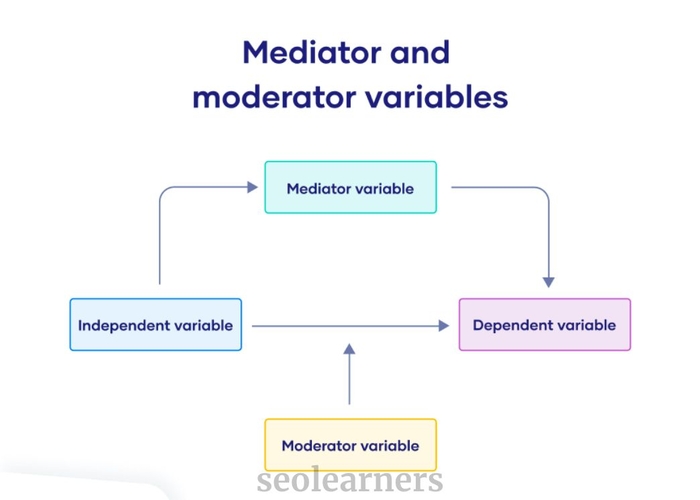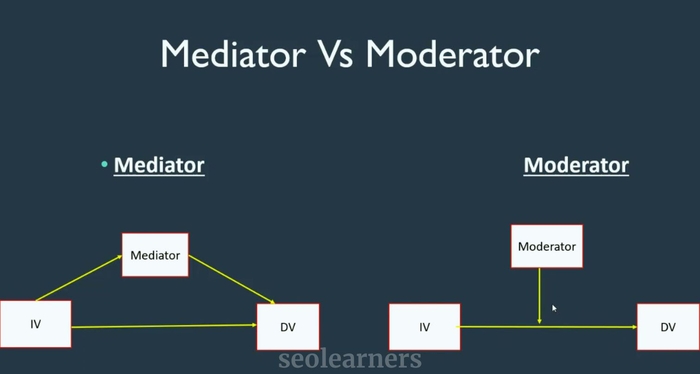Let’s know Moderator Vs Mediator, there’s always been miscommunication between moderators and mediators. This is understandable. Both terms have an identical appearance and sound. But in terms of statistics, they’re very different. Figuring out which one is suitable for you could be a challenge.
It is possible to study the connection between two factors by incorporating mediators and moderators into your research, but they will also help you avoid biases that may arise in other studies. To learn more about how to identify and utilize mediators and moderators in your research, keep reading.
Moderator Vs Mediator What is difference

Moderator
Moderators, can alter the connection between two variables and alter the strength or direction of the link. In this case, for instance, the relationship between academic performance and quality of sleep could be influenced by mental health status. It might be more prominent for people who do not suffer from mental health issues that have not been diagnosed.
Mediator
A mediator is considered an intermediary with two different variables. For example, using an intermediary of alertness, sleep quality, which is an independent variable, can affect academic performance, which is a dependent variable. It is possible to trace an arrow between an independent and the mediator within a mediation arrangement, and vice versa, from an intermediary to the dependent variables.
It is possible to draw an arrow from the moderator in order to illustrate the relationship between two independent variables in the moderation relationship.
What is a mediating variable?
Mediators provide independent variables (also known as causal variables or interventions) with an opportunity to influence the dependent variable (also called an outcome or effect). They provide a description of how and why these two are connected to each other. In all cases, triggered by the dependent variable, a mediator can affect the dependent variable. In the role of “middleman” between independent and dependent variables Think of mediators.
It is possible to determine the reason for an impact using mediators. You study a fictional causal chain when using mediation analysis. Variable B is transformed into variable C when variables A and B have an effect on it.
It is easier to understand if we state that mediation analysis reveals what or how the independent variable influences the dependent variables. The connection between independent and dependent variables disappears when the mediator is eliminated completely from the model during mediation. This is because without mediation, there is no relationship between the independent and dependent variables.
What is a moderating variable?
Moderators watch interactions, while mediators discuss the what and the why. Moderation analysis determines how an additional variable, or the moderator, impacts the relationship between dependent and independent variables.
Since they are able to alter the strength as well as the direction of the connection between dependent and independent variables, moderator variables are often referred to as products or interactions. They alter the strength of the relationship by making it stronger or weaker or by affecting it in no way.
Moderators of qualitative and quantitative nature are readily available. Test scores, weight, age, IQ, and other numerical factors constitute examples of qualitative moderators. Qualitative moderators are variables such as gender color, education, and gender that don’t have numerical significance.
Moderator Vs Mediator Examples
A simple Mediating Variable Example
Because exercise creates endorphins, it affects the dynamics of families.
Family relationships are a dependent variable, while exercise will be the primary variable. The mediators are endorphins.
The variables you have would not be connected to one another without a mediator. Even though there’s the possibility of a link in the event of moderators. As in the next example, the moderator describes the ways in which variables are affected.
A simple example of a moderator example:
As a result of problems with their eyesight, seniors are more likely to be involved in accidents.
The independent variable is accidents, while vision impairments are the dependent variables, and seniors are the moderator (you choose age as the variable to define the category “seniors”).
Other Related Articles
FAQs
What is the difference between moderator and mediator?
The relationship between two other variables can be explained by the mediator variable. The direction or strength of the connection between two variables is determined by the moderate variable.
Can a mediator also be a moderator?
Yes, While the two functions are different and perform distinct functions in the analysis of statistics, a variable may play both mediation and moderating roles.
What is a moderator vs mediator vs mechanism?
Moderator variables influence the direction and intensity of the relationship between two variables. Likewise, mediator variables describe the way two variables are linked.
What is the difference between Moderator Vs Mediator?
The process by which an independent variable affects the dependent variable via the influence of an intervening variable is studied in mediation analysis. Modulation analysis, on the other hand, analyzes the conditions that can make the connection between dependent and independent variables stronger, more effective, or less effective.
 Global Elix
Global Elix 
